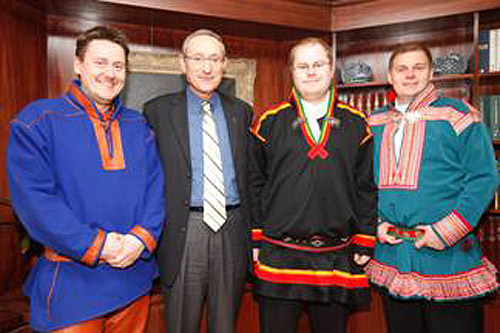
JERUSALEM (Press Release) — Representatives of the Sami minority in Norway came to the Hebrew University of Jerusalem earlier this month to learn how Hebrew is taught to students from around the world. Their goal is to apply similar teaching methods to revitalize the endangered Sami languages so they can pass them on to future generations.
An estimated 100,000 Sami people live in Lapland, a region in northern Europe stretching across Norway, Finland, Sweden and Russia. Of ten known Sami languages, several have disappeared, and some currently have as few as 30 speakers. Not all of the languages are mutually understandable.
With financial support from the Norwegian government, the Sami have launched several initiatives, such as a Sami-language kindergarten, to promote the use of their traditional languages. But their current objective is to learn how other cultures successfully revived traditional languages and to adopt those methods in their own communities.
According to delegation leader Kevin Johansen, “At first we focused on Scotland and Wales, because we had looked at how many people speak the different minority languages in Europe, and while most had declined, Scotland and Wales had some success. But they told us that it’s better for us to go to Israel, because the Israelis are the experts and they had learned from the Israelis. We wanted to learn from the best and so that’s why we decided to come here.” Johansen is an advisor for Sami issues at the University of Nordland in Norway and for the county governor of Nordland.
The delegation was greeted by Hebrew University president Prof. Menahem Ben-Sasson, who told them that the Hebrew University’s name reflected a conscious decision to emphasize the Hebrew language. Ben-Sasson encouraged their efforts to revive the Sami languages, and pointed out that while over 100 years ago few believed it was possible to bring Hebrew back to life, history has proven otherwise.
The delegation also visited the Hebrew University’s Rothberg International School, where they attended an ulpan beginners-level class, met with teachers and administrators, and learned how the Hebrew University and other institutions have taught Hebrew to vast numbers of immigrants, students and others. (An ulpan is a school for the intensive study of Hebrew.)
Johansen said, “Even though we have been here a short time, we learned a lot and we have started planning for the next trip, to bring Sami teachers for a longer stay so they can learn ulpan teaching methods. We want to focus on the spoken language so that our people are able to communicate with each other. We think that will help motivate people and lead to better results.”
The delegation was referred to the Hebrew University by Hildegunn Hansen, the press and information officer of the Israeli Embassy in Oslo. Members of the delegation included Lars Joar Halonen and Nils Ante Eira, who work for the Sami language center of the Lavangen municipality.
*
Preceding provided by Hebrew University